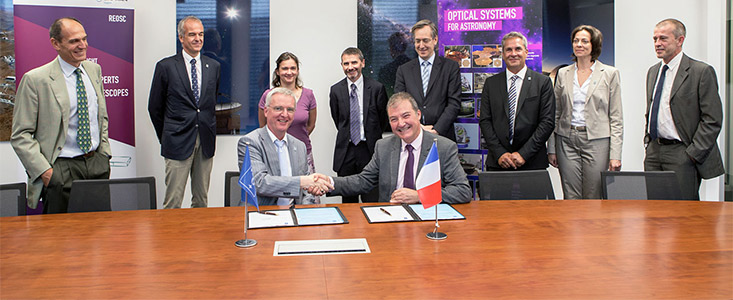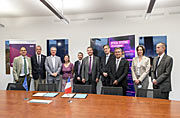Anúncio
ESO adjudica contrato para espelhos de concha deformável para o E-ELT
8 de Julho de 2015
O ESO assinou um contrato com a companhia de óptica francesa Reosc, uma subsidiária da Sagem, do grupo Safran, para a construção dos espelhos de concha deformável que constituirão o quarto espelho (M4) do European Extremely Large Telescope (E-ELT). Estes espelhos serão montados e apoiados pela unidade de espelho adaptativo (ann15045), formando assim o maior espelho adaptativo alguma vez construído.
O contrato foi assinado por representantes da Reosc e do ESO numa cerimónia que teve lugar na Sede do ESO a 8 de julho de 2015.
O sistema de espelho deformável M4 é a peça chave do E-ELT. Com 2,4 metros de diâmetro, o espelho será composto por seis segmentos de vidro cerâmico finos, cada um com apenas 1,95 milímetros de espessura. Cada concha é uma de seis secções em pétala de 60º que formarão o espelho segmentado circular M4.
A SCHOTT entregará as peças de cerâmica à Reosc, que depois fabricará e polirá as conchas finas. O consórcio AdOptica em Itália — ADS International e Microgate, em parceria com o INAF (Istituto Nazionale di Astrofisica) como subempreiteiros — fará a montagem das conchas e construirá toda a unidade de apoio (ann15045).
A preparação de protótipos deste espelho complexo durou vários anos. A Reosc fabricou o primeiro espelho fino plano para o programa E-ELT já em 2008. Este espelho de 1 metro de diâmetro e 1,95 milímetros de espessura foi depois cortado em duas pétalas e usado para o protótipo de demonstração [1]. Em 2010, a Reosc conseguiu fabricar um espelho fino de vidro borossilicato de 2,7 metros de diâmetro e cortá-lo em segmentos.
Em 2011, a Reosc entregou a primeira concha fina para o espelho deformável do Very Large Telescope (VLT). Este espelho asférico (ann12015) foi revestido e integrado na unidade de suporte e tem estado a ser testado no ESO desde o final de 2012 (potw1307a). Um segundo espelho de concha fina para o espelho secundário deformável do VLT foi entregue no final de 2013 (ann14010) e será testado no ESO no início de 2016.
A Reosc fabricará doze conchas de espelho para o M4 do E-ELT, prevendo-se a construção das primeiras seis nos próximos 5 anos e devendo a construção dos doze espelhos estar concluída até 2023.
Notas
[1] A pétala instalada no protótipo de demonstração pode ser vista nesta fotografia.
Links
- Assinado contrato para o design final e construção do maior espelho adaptativo do mundo
- ESO adjudica contrato para o estudo do projeto do espelho adaptativo para o E-ELT
- O M4 do E-ELT (Microgate)
- Uma vista expansiva do Universo – Ciência com o European Extremely Large Telescope
- Design óptico do E-ELT
- Resumo da optomecâmica do E-ELT (M. Cayrel)
- Especificações e design do espelho adaptativo M4 do E-ELT (E. Vernet et al.)
Contactos
Elise Vernet
ESO, Adaptive Optics Department (Instrumentation)
Garching bei München, Alemanha
Tel: +49 89 320 06 322
Fax: +49 89 320 2362
Email: evernet@eso.org
Lars Lindberg Christensen
Head of ESO ePOD
Garching bei München, Alemanha
Tel: +49 89 3200 6761
Telm: +49 173 3872 621
Email: lars@eso.org
Sobre o anúncio
| Id: | ann15055 |
Our use of Cookies
We use cookies that are essential for accessing our websites and using our services. We also use cookies to analyse, measure and improve our websites’ performance, to enable content sharing via social media and to display media content hosted on third-party platforms.
ESO Cookies Policy
The European Organisation for Astronomical Research in the Southern Hemisphere (ESO) is the pre-eminent intergovernmental science and technology organisation in astronomy. It carries out an ambitious programme focused on the design, construction and operation of powerful ground-based observing facilities for astronomy.
This Cookies Policy is intended to provide clarity by outlining the cookies used on the ESO public websites, their functions, the options you have for controlling them, and the ways you can contact us for additional details.
What are cookies?
Cookies are small pieces of data stored on your device by websites you visit. They serve various purposes, such as remembering login credentials and preferences and enhance your browsing experience.
Categories of cookies we use
Essential cookies (always active): These cookies are strictly necessary for the proper functioning of our website. Without these cookies, the website cannot operate correctly, and certain services, such as logging in or accessing secure areas, may not be available; because they are essential for the website’s operation, they cannot be disabled.
Functional Cookies: These cookies enhance your browsing experience by enabling additional features and personalization, such as remembering your preferences and settings. While not strictly necessary for the website to function, they improve usability and convenience; these cookies are only placed if you provide your consent.
Analytics cookies: These cookies collect information about how visitors interact with our website, such as which pages are visited most often and how users navigate the site. This data helps us improve website performance, optimize content, and enhance the user experience; these cookies are only placed if you provide your consent. We use the following analytics cookies.
Matomo Cookies:
This website uses Matomo (formerly Piwik), an open source software which enables the statistical analysis of website visits. Matomo uses cookies (text files) which are saved on your computer and which allow us to analyze how you use our website. The website user information generated by the cookies will only be saved on the servers of our IT Department. We use this information to analyze www.eso.org visits and to prepare reports on website activities. These data will not be disclosed to third parties.
On behalf of ESO, Matomo will use this information for the purpose of evaluating your use of the website, compiling reports on website activity and providing other services relating to website activity and internet usage.
Matomo cookies settings:
Additional Third-party cookies on ESO websites: some of our pages display content from external providers, e.g. YouTube.
Such third-party services are outside of ESO control and may, at any time, change their terms of service, use of cookies, etc.
YouTube: Some videos on the ESO website are embedded from ESO’s official YouTube channel. We have enabled YouTube’s privacy-enhanced mode, meaning that no cookies are set unless the user actively clicks on the video to play it. Additionally, in this mode, YouTube does not store any personally identifiable cookie data for embedded video playbacks. For more details, please refer to YouTube’s embedding videos information page.
Cookies can also be classified based on the following elements.
Regarding the domain, there are:
- First-party cookies, set by the website you are currently visiting. They are stored by the same domain that you are browsing and are used to enhance your experience on that site;
- Third-party cookies, set by a domain other than the one you are currently visiting.
As for their duration, cookies can be:
- Browser-session cookies, which are deleted when the user closes the browser;
- Stored cookies, which stay on the user's device for a predetermined period of time.
How to manage cookies
Cookie settings: You can modify your cookie choices for the ESO webpages at any time by clicking on the link Cookie settings at the bottom of any page.
In your browser: If you wish to delete cookies or instruct your browser to delete or block cookies by default, please visit the help pages of your browser:
Please be aware that if you delete or decline cookies, certain functionalities of our website may be not be available and your browsing experience may be affected.
You can set most browsers to prevent any cookies being placed on your device, but you may then have to manually adjust some preferences every time you visit a site/page. And some services and functionalities may not work properly at all (e.g. profile logging-in, shop check out).
Updates to the ESO Cookies Policy
The ESO Cookies Policy may be subject to future updates, which will be made available on this page.
Additional information
For any queries related to cookies, please contact: pdprATesoDOTorg.
As ESO public webpages are managed by our Department of Communication, your questions will be dealt with the support of the said Department.


